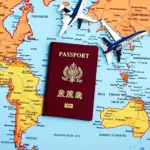Ever dreamed of exploring new cities, soaking in diverse cultures, and making a real difference in people’s lives – all while enjoying a rewarding career? Becoming a travel sonographer might be your perfect adventure. Imagine using your skills to help patients in bustling metropolises like New York City one week, then finding yourself amidst the natural beauty of Yosemite National Park the next. This unique career path combines the thrill of travel with the satisfaction of a vital healthcare role.
Soundwaves and Scenic Routes: What Does a Travel Sonographer Do?
Travel sonographers are skilled medical professionals who use ultrasound technology to create images of patients’ internal organs. They play a crucial role in diagnosing and monitoring a wide range of medical conditions. As a travel sonographer, you’d embark on short-term assignments at hospitals, clinics, and imaging centers across the country, filling staffing gaps and experiencing diverse work environments.
Mapping Your Journey: Steps to Become a Travel Sonographer
1. Earn Your Stripes: Education and Certification
- Associate or Bachelor’s Degree: Begin by earning an associate or bachelor’s degree in diagnostic medical sonography from an accredited program. Look for programs accredited by the Commission on Accreditation of Allied Health Education Programs (CAAHEP).
- Clinical Experience: Most programs include clinical rotations, giving you hands-on experience. These rotations are invaluable for building your skills and confidence.
- Certification: After graduating, aim for certification through organizations like the American Registry for Diagnostic Medical Sonography (ARDMS). Certification demonstrates your expertise and is often a requirement for employment.
2. Gaining Experience: Building Your Skillset
- Entry-Level Position: Start your career with a permanent sonographer position to gain experience and refine your skills. This will also help you determine your preferred work environment and specialty.
- Networking: Attend conferences, join professional organizations like the Society of Diagnostic Medical Sonography (SDMS), and connect with other sonographers to learn about travel opportunities.
3. Embrace the Open Road: Finding Travel Sonography Jobs
- Travel Sonography Agencies: Partner with reputable travel sonography agencies. They’ll help you find assignments, negotiate contracts, and handle logistics like housing and travel arrangements.
- Direct Application: Some hospitals and clinics hire travel sonographers directly. Explore their websites or contact their human resources departments for potential openings.
You can find travel sonography agencies that match your preferences and skills. This agency will help you find jobs, negotiate contracts, and manage housing and travel arrangements:
Packing Your Bags: What to Consider as a Travel Sonographer
Salary and Benefits
Travel sonographers often enjoy higher pay rates than their permanent counterparts, compensating for the demands of frequent relocation. Benefits packages vary by agency but typically include health insurance, housing stipends, and travel reimbursement.
Lifestyle and Adaptation
- Flexibility: Be prepared to embrace a flexible lifestyle, adapting to new cities and work environments regularly.
- Organization: Excellent organizational skills are essential for managing assignments, housing arrangements, and licenses.
- Support System: Maintain a strong support system of family and friends to stay connected while on the road.
FAQs: Answering Your Burning Questions
Q: How long are typical travel sonography assignments?
A: Assignments typically last 13 weeks, but they can be shorter or longer depending on the facility’s needs.
Q: What are the most common specialties for travel sonographers?
A: Popular specialties include abdominal, cardiac, vascular, and obstetric/gynecological sonography.
Q: Do I need a driver’s license to be a travel sonographer?
A: While not always mandatory, having a valid driver’s license and reliable transportation is highly recommended, especially for assignments in areas with limited public transport.
Travel Tips for the Modern-Day Nomad
Dr. Emily Carter, author of “The Wandering Healer: Finding Your Path in Travel Healthcare,” emphasizes the importance of packing light and embracing local experiences. She says, “Packing strategically allows you to move freely and explore your temporary home. Don’t be afraid to try new restaurants, visit local attractions, and truly immerse yourself in the culture.”
Here’s a visual guide to help you pack strategically for your travels as a travel sonographer:
Finding Harmony: Feng Shui and Your Travel Adventures
In the world of Feng Shui, travel is seen as a powerful way to enhance personal growth and invite new opportunities. Consider packing a personal item that symbolizes good luck or prosperity for your journey. A small jade plant, known for attracting wealth and good fortune, can add a touch of positive energy to your temporary living spaces.
Embark on Your Ultrasound Adventure
Becoming a travel sonographer offers an exciting blend of professional fulfillment and personal enrichment. By following these steps and embracing the adventure, you can hit the open road, use your skills to make a difference, and create unforgettable memories along the way.
For more insights into travel healthcare careers and resources, visit TRAVELCAR.edu.vn.
